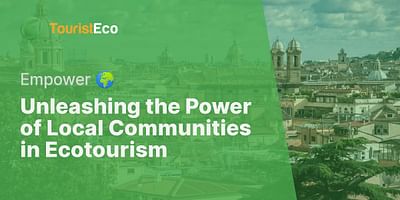Ethan is a nature lover and sustainable tourism enthusiast. He believes that responsible travel is essential for protecting our planet's natural resources and biodiversity. Ethan enjoys exploring new eco-friendly destinations and learning about local cultures and traditions.
Education plays a crucial role in promoting sustainable tourism and fostering a deeper understanding of the importance of responsible travel practices. By educating ourselves and others about sustainable tourism, we can make informed choices that have a positive impact on the environment, local communities, and cultural heritage. Let's explore some of the key benefits of education in promoting sustainable tourism:
1. Environmental Conservation: Education raises awareness about the fragility of our natural resources and the need to protect them. By understanding the impact of our actions on the environment, we can make conscious decisions to minimize our carbon footprint, conserve water, reduce waste, and support eco-friendly initiatives. Education empowers travelers to appreciate and preserve the beauty of our planet for future generations.
2. Cultural Preservation: Sustainable tourism is not just about protecting the environment; it also involves respecting and preserving local cultures and traditions. Education helps travelers appreciate the cultural diversity of different destinations and understand the importance of preserving cultural heritage. By learning about local customs, traditions, and etiquette, we can engage in respectful interactions with local communities, fostering mutual understanding and appreciation.
3. Economic Development: Sustainable tourism can contribute to the economic development of local communities. Education equips travelers with knowledge about the economic benefits of supporting local businesses, artisans, and farmers. By choosing to stay in locally-owned accommodations, eating at local restaurants, and purchasing locally-made products, travelers can directly contribute to the economic well-being of the community. This, in turn, helps create employment opportunities and improves the quality of life for local residents.
4. Community Empowerment: Education empowers local communities to actively participate in sustainable tourism initiatives. By providing training and educational opportunities, communities can develop skills and knowledge that enable them to engage in responsible tourism practices. This can include offering eco-tours, promoting sustainable agriculture, or creating handicrafts using environmentally friendly materials. Education helps communities realize the economic and social benefits of sustainable tourism, encouraging their active involvement in preserving their natural and cultural assets.
5. Long-term Sustainability: Education fosters a mindset of long-term sustainability. By understanding the interconnectedness of environmental, social, and economic factors, travelers can make choices that prioritize the well-being of all stakeholders. Education encourages travelers to seek out destinations that prioritize sustainable practices, such as renewable energy, waste management, and conservation efforts. By supporting these destinations, we can contribute to their long-term sustainability and inspire others to follow suit.
In conclusion, education is a powerful tool for promoting sustainable tourism. It enables travelers to make informed choices that protect the environment, preserve cultural heritage, support local communities, and ensure long-term sustainability. By educating ourselves and others, we can collectively create a more responsible and sustainable travel industry, benefiting both present and future generations.
For more information on sustainable travel tips, eco-friendly destinations, and green travel accessories, visit















